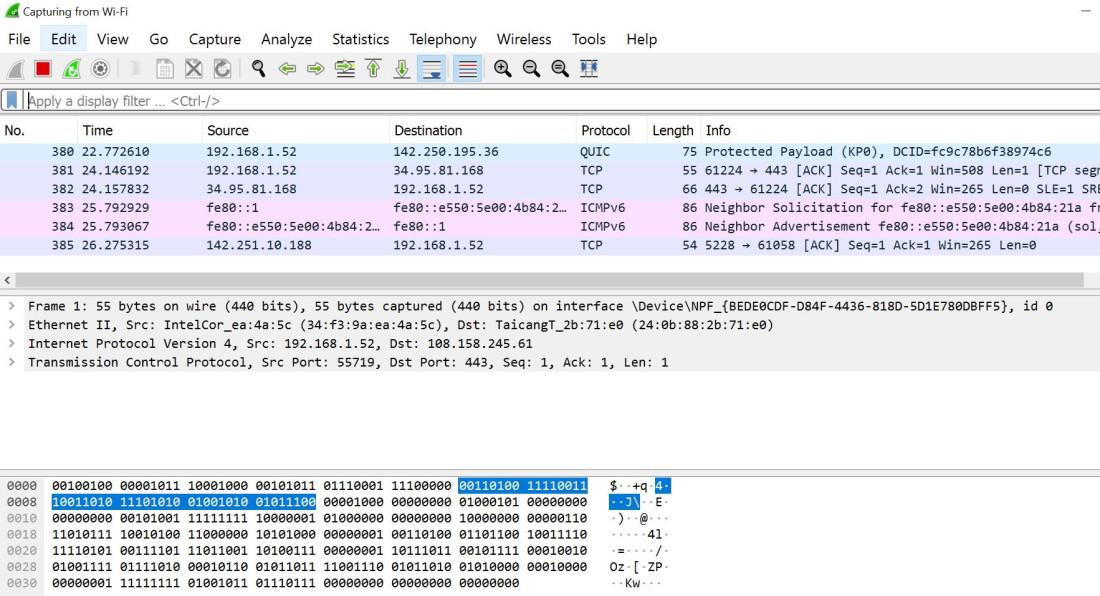Wireshark is a software tool used to monitor the network traffic through a network interface. It is the most widely used network monitoring tool today. Wireshark is loved equally by system administrators, network engineers, network enthusiasts, network security professionals, and black hat hackers.
It is a network protocol analyzer that captures packets from a network connection. The packet is the name given to a distinct unit of data in a typical Ethernet network.

System Requirements :
System requirements are the required specifications a device must have in order to use certain hardware or software. Before installing a software program or purchasing a hardware device, you can check the system requirements to make sure the product is compatible with your system. Typical system requirements for a Wireshark include:
The system requirement of Wireshark depends on the environment in which you are using it and on the size of the captured file you are going to examine. If the files captured are large then they will require more memory and disk space. The time-consuming task like packet filtering or packet analysis is single-threaded in Wireshark. Therefore it does not make a difference whether you are using Multiprocessor/Hyper thread systems or not.
System Requirements for Windows :
Wireshark should work for any version of Windows that is still within its extended support period. Wireshark currently supports Windows 11, 10, 8.1, 8, Server 2019, Server 2016, Server 2012 R2, and Server 2012. The following requirements are also needed:
- 64-bit AMD64/x86-64 or 32-bit x86 CPU architecture.
- At least 500 MB available RAM. It requires more RAM to process Larger capture files.
- At least 500 MB of available disk space. The capture files require extra disk space.
- It requires a minimum resolution of 1280 × 1024 or higher.
A supported network card for capturing packets. In the case of Ethernet, any card supported by Windows should work and in the case of WLAN, it requires special equipment to capture raw 802.11 information.
The older version of Wireshark supports Windows which is outside Microsoft’s extended lifecycle support.
- Wireshark 3.6 was the last official release to support 32-bit Windows
- Wireshark 3.2 was the last official release to support Windows 7 and Windows Server 2008 R2.
- Wireshark 2.2 was the last official release to support Windows Vista and Windows Server 2008 sans R2
- Wireshark 1.12 was the last official release to support Windows Server 2003
System Requirements for macOS:
Currently, Wireshark supports macOS 10.13 and later. The older version of Wireshark before 3.6 supports macOS 10.12. The other system requirements are similar to the specifications listed above for Windows.
- Wireshark 3.4 was the last official release to support macOS 10.12.
- Wireshark 2.6 was the last official release to support Mac OS X 10.6 and 10.7 and OS X 10.8 to 10.11.
- Wireshark 2.0 was the last official release to support OS X on 32-bit Intel.
- Wireshark 1.8 was the last official release to support Mac OS X on PowerPC.
System Requirements for UNIX/LINUX:
Wireshark also runs on most UNIX and Linux distros and most BSD variants. The other system requirements are similar to the specifications listed above for Windows.
Wireshark Binary packages are available for the following platforms :
- Alpine Linux
- Arch Linux
- Red Hat Enterprise Linux / CentOS / Fedora
- Debian GNU/Linux
- FreeBSD
- Oracle Solaris
You can also refer to the article How to Install Wireshark on Windows? to know more about Wireshark.




